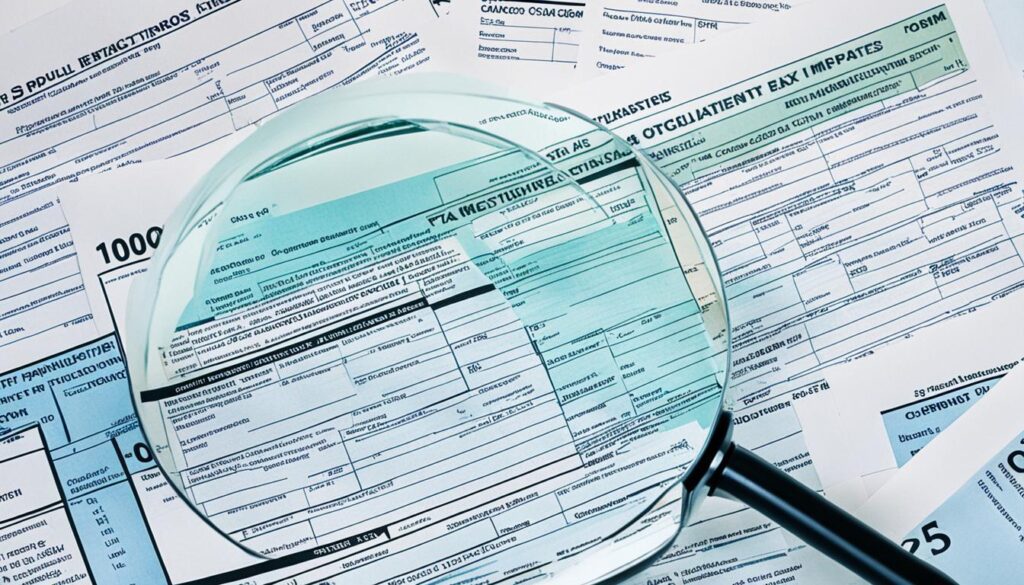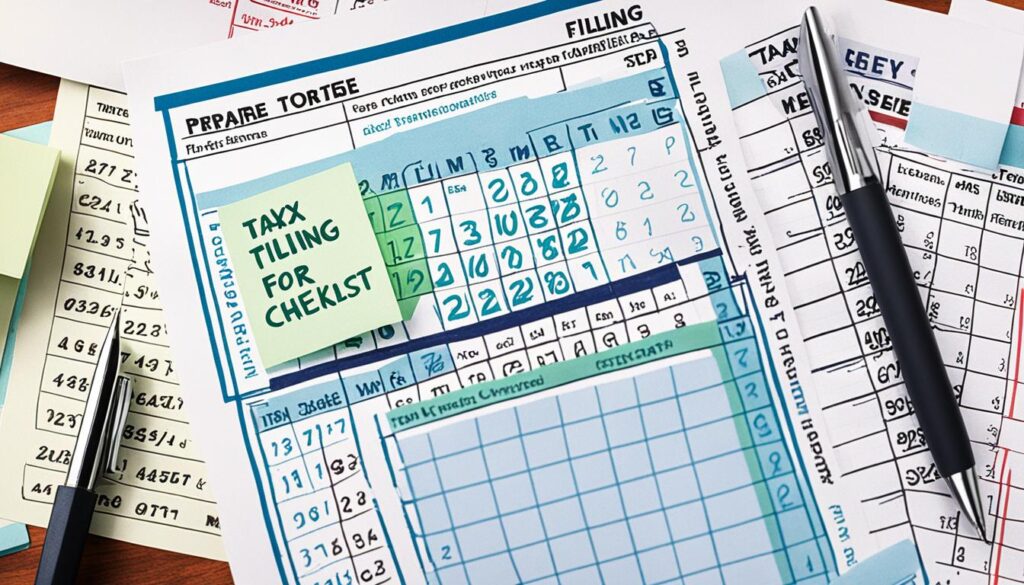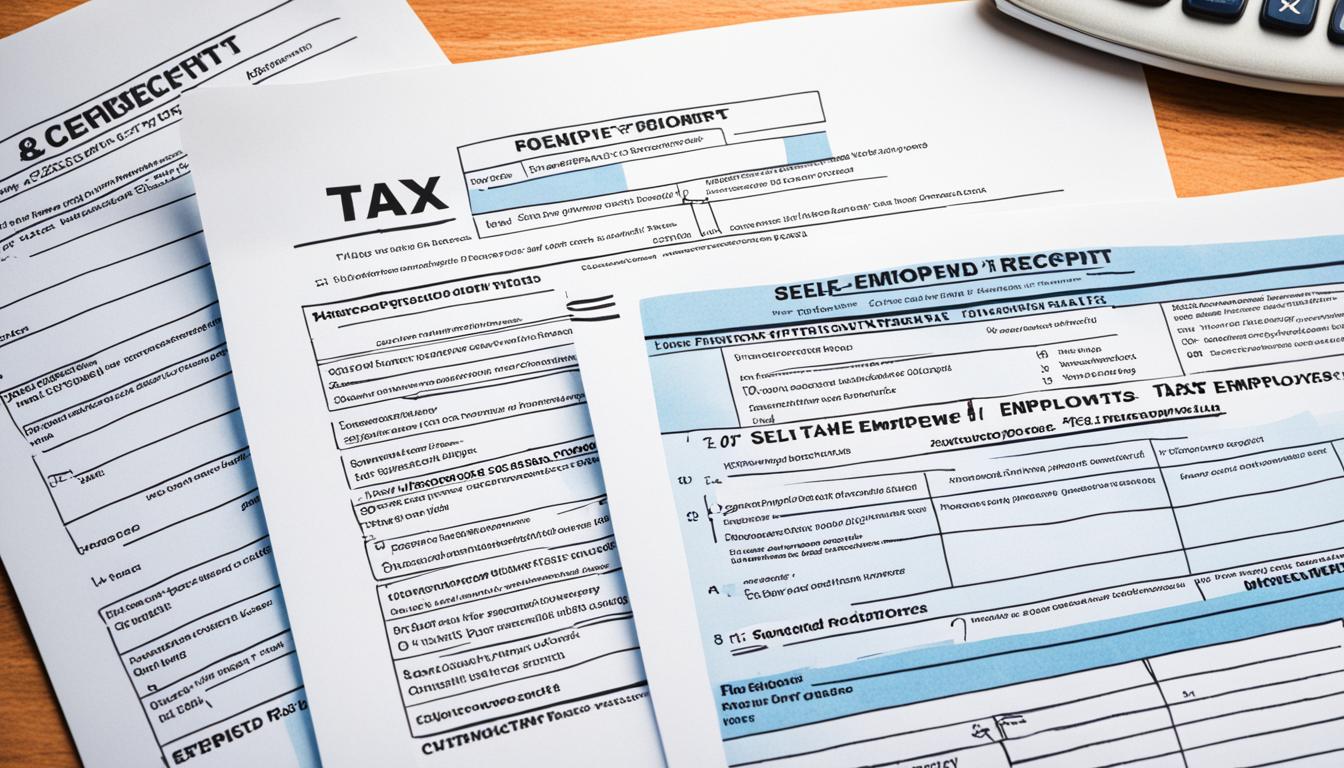Ever wonder why some small businesses have a hard time making it? It often comes down to how well they handle their taxes. Understanding and managing small business taxes can be tough. Yet, it’s key to keep your business financially healthy and within the law.
At the federal, state, and local levels, small businesses face many taxes. They deal with federal income tax, self-employment tax, and more, including sales tax. Knowing which taxes affect your business and managing them well is vital.
The tax rules can be complex and vary by the type of business. Small business owners face different tax forms based on their business structure. Sole proprietors, partnerships, and corporations all file through different forms, like 1040 and 1120.
If you’re a sole proprietor or a partner, you must pay self-employment tax. This goes towards Social Security and Medicare. You file this tax with Schedule SE. For employment taxes, both employees and employers share the responsibility. They report this through forms like 941 and 940 for FUTA taxes.
Businesses often have to make estimated tax payments every quarter. This applies to sole proprietors, C corporations, S corporations, and partnerships. They use Form 1040-ES and 1120-W to do this.
Some businesses also need to handle excise taxes. This is for specific goods and services. Forms like 720 and 2290 are used. Also, businesses must pass on sales taxes from taxable sales to local governments regularly.
Besides, state and local governments charge various other taxes and fees. But, there are also many ways to reduce these costs. Businesses can use deductions, credits, and more to save money, like the Work Opportunity Tax Credit and others.
Good tax planning means keeping track of all income and expenses. It also means paying your estimated taxes on time to avoid penalties. Using accounting and tax software can make this easier.
Grasping the basics of small business taxes will help your business do well. Our detailed business tax advice can guide you through the taxing process. We aim to help your business not just survive but flourish.
Understanding Different Business Tax Types
It’s important for business owners to know about the five key taxes. These taxes touch various business types like sole proprietorships and different corporations. Knowing your tax duties is key for following the rules and keeping your business healthy.
Let’s look at the main tax types:
- Income Taxes: Except for partnerships, all businesses must file an income tax return yearly. Partnerships have their own form. Your business location and type determine if you owe federal and state income taxes.
- Estimated Taxes: Startup owners often pay estimated taxes every three months. This helps avoid a big tax bill at year’s end.
- Self-Employment Taxes: If you’re a sole proprietor, partner, or in a limited liability company, you pay this. It covers your Social Security and Medicare, usually deducted from a paycheck.
- Employment Taxes: Businesses with employees must handle several taxes like federal income, Social Security, and Medicare. It’s vital for a proper payroll.
- Excise Taxes: Some businesses pay taxes on specific goods like fuel, cigarettes, and alcohol. This is part of the broad tax landscape.
For many small business owners, taxes seem complex. Getting business tax advice can help craft smart money plans. The Hartford has been helping for over 200 years, guiding all kinds of businesses.
Knowing the ins and outs of these taxes helps businesses make smart choices. This ensures they follow all rules while managing their money well. Understanding both federal and entrepreneurial taxes guides growth and success.
Small Business Taxes: Key Requirements and Obligations

Running a small business means you’ll have to manage many taxes. One key duty is the self-employment tax. You must file Schedule SE with your 1040 forms if you make over $400. Church employees must do the same if they earn more than $108.28.
If you have employees, you’ll deal with more taxes. These include social security, Medicare, federal income tax withholding, and unemployment tax (FUTA). It’s important to report and pay these taxes on time. They are vital to your business’s financial duties.
Your business might also need to pay federal excise taxes on certain goods and services. Examples are environmental, communications, air travel taxes, and fuel taxes. Pay these taxes using Form 720. Businesses in betting or owning heavy trucks must use forms like Form 730 and Form 2290.
Businesses must also pay estimated taxes regularly. This applies to sole proprietors, partnerships, and corporations. They must predict their tax bills to avoid fines. Use Form 1040-ES or Form 1020-W for these payments.
State and local taxes are part of your duties too. These can be sales, state income, property taxes, and business license fees. The rules change depending on where you are. Knowing your local and state tax laws helps you stay compliant and manage your finances well.
To sum up, handling your small business taxes, from self-employment to estimated taxes, is crucial. It keeps your business legally safe and financially sound.
Importance of Getting an Employer Identification Number (EIN)
Getting an Employer Identification Number (EIN) is very important for small businesses. It helps with tax compliance and business deductions. An EIN is a special number for your business with the IRS. It’s needed for tax returns and tax transactions.
Sole proprietors and single-member LLCs might not need it if they don’t have employees. But, there are many times when an EIN is needed. For example, if you have employees or want your LLC to be taxed as a corporation.
- If you have employees.
- Opt to have your LLC taxed as a corporation.
- Operate as a tax-exempt business.
- Purchase or inherit the business.
- Maintain a retirement plan.
- File for bankruptcy.
It’s easy, quick, and free to apply for an EIN on the IRS website. This number is important for keeping personal and business money separate. It makes your business legitimate and ready for growth. It also helps non-U.S. business owners expand their options.
Having an EIN can also make IRS audits less likely for certain business deductions. Clients often prefer businesses with an EIN for taxes. International entrepreneurs can get an EIN over the phone, which makes things easier.
Some places might let you open a business bank account without an EIN, but most want one. Having an EIN helps make your business strong, legal, and credible.
State and Local Tax Obligations

Knowing about state and local taxes is key for small businesses. It helps them with business tax planning. They can follow rules better and manage money well in different places.
- Most states have sales taxes, except for some like Alaska and Delaware. These taxes impact how businesses set prices.
- State taxes can involve fees to start a business, taxes on income, and sales and use taxes. Each state has its own rules.
- Local authorities might tax personal property used in business. This adds more rules to follow.
- Federal excise taxes apply to making or selling certain products and the first sale of big trucks. Some businesses paying these taxes include ones taking bets.
- Small businesses need to file federal income tax returns regularly. They might also pay self-employment and employment taxes, which adds to the complexity of tax planning.
While state and local taxes bring challenges, they also have benefits. There are deductions and credits available. Knowing and planning for these taxes helps businesses stay financially healthy.
Common Tax Deductions for Small Businesses
Small business owners can save a lot on taxes with business deductions. If you handle tax for startups or keep up with tax compliance, knowing what you can deduct is key.
A self-employed writer cut his taxes by $1,500. He did this by deducting $6,000 for contractor work. This shows why it’s vital to document every business deduction well.
- Advertising and promotion
- Bank fees
- Business meals
- Business insurance
- Business use of a car
- Contract labor
- Depreciation
- Education
Keeping regular books is smart for small business owners. It helps find deductions and saves tax money. For example, Joe saved over $1,500 by tracking his expenses well.
For tax for startups and tax compliance, detailed expense records are a must. This includes costs from office supplies to employee benefits. You can fully deduct educational costs if they boost your business skills. Plus, using depreciation well can lead to big tax savings.
Using all business deductions helps save a lot. Keep good records to back up your claims and save the most money.
Creating a Tax Filing Calendar

Making a tax calendar is key for small business owners. It helps avoid late fees by being prepared. Here are steps to make sure you don’t miss anything important:
- Federal Estimated Tax Deadlines: Jan 16, Apr 15, Jun 17, Sep 16, and Jan 15 (of the following year).
- Important Small Business Tax Calendar Dates for 2024: Jan 31, Feb 28, Mar 15, Apr 18, Apr 15, Jun 17, and Sep 16.
2. Maintain Essential Documentation
- Federal Tax ID Number
- Social Security Number
- Previous Year’s Tax Return
- Accounting Journals, Balance Sheet, Income Statement
- Bank Statements, Invoices, Receipts, Mileage Logs
Organizing all documents is a must for easy filing. Make sure to save things like Schedule C and Form 1120. Visit this tax prep guide for help.
3. Understand Tax Rates and Responsibilities
- Federal Tax Rate for C Corporations: 21%
- Self-Employment Tax Rate: 15.3% (comprising 12.4% for Social Security and 2.9% for Medicare)
- Social Security and Medicare Tax Rates for Employers: 12.4% and 2.9%
- Federal Unemployment Tax Rate (FUTA): 6% on the first $7,000 of income per employee
- Various Excise Tax Rates depending on specific goods or services
Having a tax calendar helps small businesses be responsible. It makes tax season easier and keeps businesses ready for anything. Plus, it helps in managing finances better.
Essential Tax Forms for Different Business Structures
Knowing the right tax forms for your business is key. It helps report profits and losses well. This affects your taxes and money matters a lot. Here, learn which forms fit different business types. This is important tax advice for businesses.
- Sole Proprietorships: These owners use Form 1040 for taxes, adding Schedule C to talk about business earnings or losses. If they think they’ll owe more than $1,000 in taxes, they should pay quarterly.
- Partnerships and LLCs Filing as Partnerships: They report income or loss with Form 1065. Each partner gets a Schedule K-1 for their part of income, deductions, and credits.
- S Corporations: NFIB says 47% of businesses are S-Corps. They file Form 1120-S and give out Schedule K-1s to shareholders. This way, they save on some taxes.
- C Corporations: These corporations, 17% of the total, must use Form 1120 for detailed tax reports on income and losses.
- Employment Taxes: Businesses with workers file Form 941 quarterly, or Form 943 yearly for farm workers. Form 940 is for unemployment taxes yearly.
- Form 1099-NEC: Businesses give this to freelancers paid $600 or more in a year, by January 31. Most bosses (91%) get a tax pro for this, says NFIB.
Following expert tax guidance ensures proper filing. This leads to better tax management and using deductions well. Keeping good records, like income and receipts, makes tax time easier for business owners.
Leveraging Tax Credits and Deductions
For small business owners, understanding deductions and tax credits is key. It helps with tax compliance and growth. The variety of business expenses is wide, and finding deductible costs can lower taxes. Examples include deductions for office supplies, travel, and entertainment.
It’s important to keep detailed expense records. This helps in maximizing deductions and avoiding IRS problems. Deductible expenses cover:
- Business-related travel expenses such as airfare, hotels, and car rentals
- Office supplies and equipment
- Advertising and marketing costs
- Health insurance premiums
- Home office expenses
Getting advice from tax pros is very helpful. They can tell you which costs are “ordinary and necessary.” This means they’re okay to deduct. Small companies, which are a huge part of U.S. business, can use these tips to keep more money.
Also, knowing the latest tax laws is a must. For example, the 2017 Tax Cuts and Jobs Act made big changes, like lowering the tax rate for corporations. Businesses can get tax credits for hiring certain people, for research and development, and for using clean energy. Some of these can cover up to 30% of the cost.
To make the most of tax credits and deductions, follow these tips:
- Keep detailed records of all business expenses.
- Talk to a tax pro to know which deductions you can take.
- Keep up with tax law changes to use deductions and credits well.
- Make sure all your paperwork is correct and follows IRS rules.
Smart use of deductions and credits helps companies save on taxes and stay healthy financially. Experts like Sorge CPA and Business Advisors can guide businesses through tax rules to get the most benefit.
By using these strategies, businesses can handle their money better and stay ahead in their field.
Tax Preparation Checklist for Small Businesses
As small business owners, being organized and following the rules is key. Here’s a detailed checklist for tax time. It will help you handle your tax obligations and make tax season easy.
- Organize Tax Documents: Collect all your receipts, invoices, and bank statements. Keep clear records for costs like ads, staff benefits, and professional fees.
- Understand Business Tax Forms: Learn which forms your business needs. C corporations file Form 1120. S corporations use Form 1120-S. Partnerships and LLCs file Form 1065. Sole proprietorships or single-member LLCs use Schedule C with Form 1040.
- Record Keeping: Keep good records all year. Use software for receipts and accounting to help with your books. This makes reports easy to do.
- Estimated Tax Deadlines: Pay taxes every quarter to avoid fees. Important dates are Jan 16, April 15, June 17, and Sept 16, 2024, plus Jan 15, 2025.
- Payroll Taxes: File all payroll tax returns on time. Make sure employment taxes are paid. Use Form 941 or others as needed.
- Additional Schedules or Forms: You may need extra forms for certain business activities. This could be for excise taxes on particular goods or actions.
- Documents for Verification: Keep I-9 forms to check new workers can work in the US.
- Financial Statements: Have a trial balance, balance sheet, and reconciliation statements ready. They show your finances clearly.
- Loan Documentation: Include info for any loans. This could be statements, contracts, and schedules for loans you took, paid, or were forgiven.
- Tax Returns for States: If needed, have copies of sales tax returns for each state.
- Questions for Tax Preparer: Write down any issues or weird things in your money records to talk about with your tax person.
Using this checklist for tax prep helps you with your tax obligations. It also makes a big difference in business tax planning. And it leads to a successful, worry-free tax time.
Tips for Staying Tax Compliant
As a small business owner, you must keep up with taxes. This avoids big fines and extra charges from late payments. Make sure you pay your quarterly taxes if you owe more than $1,000. Also, using a business credit card helps keep personal and business costs separate. This makes tracking your spending and deductions easier.
Knowing tax rules like Section 179 is important. It lets you deduct the total cost of some equipment and software. This can save a lot of money. Also, putting money into retirement accounts like a Traditional IRA, Roth IRA, 401(k), or SEP IRA can lower your taxes. This helps you plan your finances better.
It’s key to stay updated on tax laws. They change often. For example, the gift and estate tax exemptions will go down at the end of 2025. Planning ahead is essential. Also, check the IRS mileage rate yearly to write off business driving correctly. Knowing about taxes for pass-through entities (PTE) helps too. Managing these tax duties carefully helps your business run smoothly and stay financially healthy.


